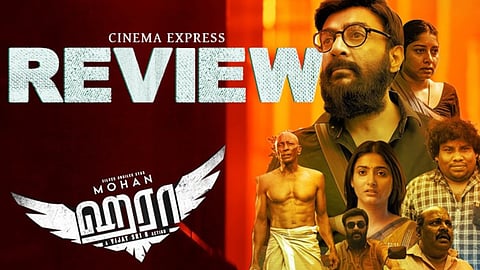Haraa Movie Review: A bland thriller bogged down by a convoluted screenplay
Haraa(1.5 / 5)
After back-to-back hits in the 80s and a long absence, Mohan is finally back in Haraa where he takes the role of a vigilante hero, a saviour and a villain all at once. Just like how his character travels far and wide to unravel the mystery around the death of his daughter, Nimisha, the plot too meanders all over the place, stumbling along the way.
Cast: Mohan, Anumol, Anithra Nair, Yogi Babu, Charuhasan, Rajendran, Vanitha Vijayakumar and Suresh Chandra Menon
Director: Vijay Sri G
Rating: 1.5/5
Haraa centres around Ram (a) Ibrahim who is grieving the loss of his daughter after she dies by suicide. He goes on a mission to uncover secrets and avenge her death. In the first scene, Mohan heads out to look for clues. He gets inside an auto, speaks to two or three people, and then into an ambulance when he sees a few people following him. After this, he gets onto a bike. Similarly, the screenplay moves from one pointless scene to another, mostly in circles, sometimes in triangles and at moments, all over the place. The story takes Ram through a gritty criminal world mired in ugly politics and a plethora of complications that come along with it. Instead of unravelling it in a way that tests the knowledge of a discerning audience, it holds exposition as a crutch to drag its way through the plot, eventually killing suspense and other elements that would have made it much more interesting.
At the crux of Haraa is a dad-daughter love story that deserves better writing. Sometimes, the film takes their relationship a tad too far. When I say too far, it goes to the extent of mistaking patriarchy and regressive mentality for love and progressiveness. In perhaps the most bizarre scene of them all, Ram goes to Nimisha’s school to tell the teachers that she won’t be able to attend the exam as she had her menarche. Even when the teachers reiterate that they would provide her with sanitary products to help her deal with it, he denies it and agrees on her behalf to skip a year of education. In the raging debate around menstrual leaves, women have always asserted their choice, but for a man to speak in her name only takes the conversation back to a few decades. Speaking of it, even the parents finding out about her menarche is straight out of a ‘90s film.
Haraa attempts to paint Mohan as a simple man who goes to great lengths to avenge the death of his daughter. But the film thrusts lyrics like “Maassuke maasu Ivan, Silver Jubilee star ivan,” clearly picturing him as a hero making a comeback. In another scene, Mohan beats several goons in a bus. He delivers one blow to a guy’s face and Rajendran goes, “Mouna Raagam parakudhe.” The botched meta-commentary goes on. There’s another blow and he says, “Mella Thirandhadhu un mandai.” Apart from Rajendran, there are Yogi Babu, Deepa Shankar, Singampuli, and Aadhavan who cross paths with Mohan at different intervals to provide what the makers thought would be ‘comic relief’. Instead, they stick out like a sore thumb and are completely out of place. The dialogues don’t help either and are a desperate cry to help fix the screenplay which is stretched so far to encompass several elements that remain as fragments in an already convoluted storyline. Adding to it are several lip-sync and messy dubbing issues. Anumol, who had an earnest performance in Ayali, is terribly underutilised. Worse, she is made into a classic, overly sentimental mother.
One moment there is a message about fake medications and in another immediate scene, he dives into the issues of sex trafficking, at random. He becomes a man who struggles to bring justice to everyone, not just his daughter, taking on everyone's problems like his own. With unnecessary hero-elevation music, the film feels like it was only made to push the actor in all his glory, showcasing him as a hero we've never seen before.
The biggest setback for Haraa lies in its depiction of a few stock villains. If they were not enough, the film introduces some more—Like Charuhasan, who manages to find a five-minute screen time, which adds completely no value to the plot. And then there are characters like ‘Kalla Thupakki’ Ravi and ‘swimming pool’ Sarala. One deals with weapons day in and out, while the other is an agenda-driven villain who would be happy to drink women’s tears for breakfast. But what is appreciation-worthy is the way Ram handles the male villains who suffer from common medical issues.
However, even as Nimisha suffers much agony, distress and trauma, Haraa ensures that the audience stays disconnected from her character. By the end of the film, I was not invested in Nimisha’s story and the reason behind her death or her father’s efforts to dig into the underbelly of crimes. While Ram may or may not have gotten his life back, I was relieved to get back to my life as the credits started rolling.

